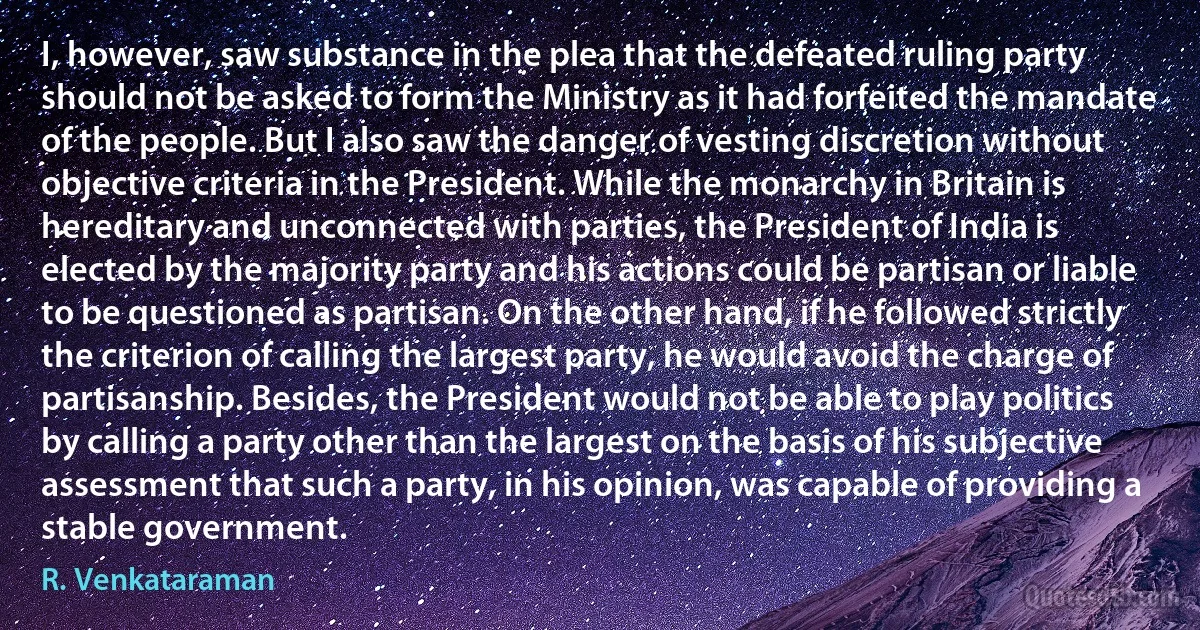
I, however, saw substance in the plea that the defeated ruling party should not be asked to form the Ministry as it had forfeited the mandate of the people. But I also saw the danger of vesting discretion without objective criteria in the President. While the monarchy in Britain is hereditary and unconnected with parties, the President of India is elected by the majority party and his actions could be partisan or liable to be questioned as partisan. On the other hand, if he followed strictly the criterion of calling the largest party, he would avoid the charge of partisanship. Besides, the President would not be able to play politics by calling a party other than the largest on the basis of his subjective assessment that such a party, in his opinion, was capable of providing a stable government.
R. VenkataramanRelated topics
able assessment calling charge criterion danger discretion form government hand mandate ministry monarchy objective opinion partisan partisanship party people play politics president saw should stable while britainRelated quotes
For what advantage is it, that the world enjoys profound peace, if thou art at war with thyself? This then is the peace we should keep. If we have it, nothing from without will be able to harm us. And to this end the public peace contributes no little: whence it is said, ‘That we may lead a quiet and peaceable life.' But if any one is disturbed when there is quiet, he is a miserable creature. Seest thou that He speaks of this peace which I call the third (inner, ed.) kind? Therefore when he has said, ‘that we may lead a quiet and peaceable life,' he does not stop there, but adds ‘in all godliness and honesty.' But we cannot live in godliness and honesty, unless that peace be established. For when curious reasonings disturb our faith, what peace is there? or when spirits of uncleanness, what peace is there?

John Chrysostom
The defeat of Fascism, and the election of a majority Labour Government in 1945 was only possible because Labour had strong mainstream support among working class voters and organised labour. There was no serious Communist Party in Britain, and no serious fascist party either and the principle reason for this is that both were consistently defeated by Labour who maintained working class loyalty precisely because it was not an ideal or a set of principles, but an organisation that upheld the dignity of work and of working people and insisted that they had a constructive role to play in the governance of the country. Labour did not flirt with the popular front or the unity of progressive forces. It pursued a common good which included labour as an interest and as a source of value.

Maurice Glasman, Baron Glasman
Women I know are outraged that Democrats think that women are nothing more than helpless and hopeless creatures whose only goal in life is to have the government provide for them birth control medication. Women I know are smart, educated, intelligent, capable of doing anything that anyone else can do. Our party stands for the recognition of the equality of women and the capacity of women. That's not a war on them, that's a war for them. And if the Democrats want to insult the women of America by making them believe that they are helpless without Uncle Sugar coming in and providing for them a prescription each month for birth control because they cannot control their libido or their reproductive system without the help of government then so be it!

Mike Huckabee
Scotland and Ireland were virtually disfranchised; Edinburgh and Glasgow, the two largest cities of Scotland, had each a constituency of only thirty-three members. A majority of the members of the House of Commons were elected by six thousand voters. This state of affairs afforded ready opportunities for the moneyed aristocracy to buy seats in Parliament, by the purchase of a few voters in rotten boroughs ; and also enabled the ministry to secure a servile majority in the Commons. The corruption resulting from these conditions, as exhibited in the latter half of the eighteenth century, can hardly be realized by the present generation. They afford, however, an illustration of the universal truth, that a government which does not draw its inspiration of liberty, justice, and morality from the people will soon become both tyrannical and corrupt.

James A. Garfield
It should be clear by now that there are people who can, in fact, be reasonably considered experts; that it is rational to rely, within limits, on ex pert opinion; and that it is possible, by exercising relatively simple criteria, to gain insight into whether a particular expert is reliable or not. It is also true that experts, of course, do make mistakes, and that even the agreement of a large majority of experts in a field does not guarantee that they got it right. That's the nature of scientific truth, as we have seen throughout this book: it is tentative, because it is the result of a human endeavor that is limited both by the type and amount of available evidence and by humans' finite mental powers and emotional reactions. But the examples above show how you can, with a little bit of practice, tell science from bunk!

Massimo Pigliucci
